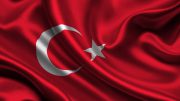If Turkey’s constitution is amended on the 16th of April, nationalism could rise – and the already imperilled queer community may bear the brunt of what follows.

On April 16, Turkish citizens will vote for or against building a “New Turkey,” as President Recep Tayyip Erdoğan has called the monumental constitutional reform package currently tearing the country in two. The reform would increase the president’s powers to declare laws by decree and eliminate the role of the prime minister. Critics, from human rights watch groups to Turkey’s main opposition parties, fear a “yes” vote will place Turkey under one man’s rule. Many fear it could also bring consequences for all sorts of marginalized groupsthere, significantly so for the country’s LGBTQ community.
The referendum has unfolded amid rising nationalism, wide-reaching dismissalsof government employees, and detentions and arrests of activists and organizers in the wake of the country’s failed government coup last July. Since the attempted coup, Turkey has existed under a state of emergency; according to Human Rights Watch, over 47,000 people have been jailed and 160 independent media outlets have shuttered since July, and the amendment would cement many of the ruling powers Erdoğan has taken on since the state of emergency was declared.
As Turkey braces for its referendum vote, we spoke to four members of the LGBTQ community in Istanbul about what place they might have in a “New Turkey.”

Çagla Akalin, 27, actress
In the last five years we have become more free and more comfortable, so yes, Turkish society is more accepting of the LGBT community. The issues and problems we face here are the same as in other countries. Being LGBT is a problem everywhere in the world.
We are being normalized. We use public transportation; we are now part of social life. Trans women didn’t use to walk on Istiklal [Istanbul’s most famous pedestrian street]; they couldn’t be visible in the street. They had to stay in at night. We are present in social media and people see us more and listen to us. We have more outlets to express ourselves. Turkish society is not becoming more conservative. It is becoming more open minded.
I am Muslim, and my freedoms shouldn’t interfere with other people’s freedoms. I think that Turkish society and the government have the right to ban the parade. The gay pride organizers should have been more respectful of religious people.
Erdoğan is not someone to fear. The foreign press tries to show him as a dictator because he is brave enough to stand against foreign leaders. There are many trans women like me who share my political views and who will say “yes” in the referendum.

Rozerin Seda, 35, human rights lawyer
I feel very lucky that nothing has affected me yet. If the constitutional reform package is approved, the president will be able to touch everything.
Lawyers are keen to be in cases involving disadvantaged groups, but it is risky, and we face problems with solidarity. You have to be brave enough to be very visible, and you will get called gay, trans, or lesbian. The same thing happens with lawyers working on the Kurdish issue—if you defend Kurds, you are called ‘pro-Kurdish’ or ‘terrorist.’ Nobody picks up our calls.
In 2010, the government was more accepting of LGBT people. Now they are considered a sin and that sends a clear message: My religion will never accept you.
The constitution doesn’t have any specific protection for LGBT people. Guaranteeing equal rights based on sex is not enough. Specifying LGBT protections in the constitution or changing the education system can make a real difference, and political intent is very important.

Eylem, 35, translator
I am a trans woman, but I find identities limiting. We move in the streets in groups all the time. This protects us a bit; it’s our lifestyle. My lifestyle is a kind of protection. LGBT people must live together, otherwise they can’t live.
In Turkey it can all change suddenly. Life is traumatic and we accept it, we are an elastic society. The LGBT community was the star of the Gezi movement [ large anti-government demonstrations that took place in 2013]. LGBTQ people were mixing with society in those days. Today and for the last four years, we have been separating. You must nourish solidarity. You need forums, campaigns and activism, but our society is terrorized.
For me, a “yes” result on the referendum doesn’t just affect LGBT rights—it represents a war against society. If you lose human rights, you lose LGBT rights. If you lose humanity, you lose LGBT rights. There is no distinction.
Source: vice.com



Be the first to comment at "How Turkish LGBTQ are preparing for Constitutional Vote? – Photos"